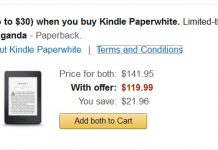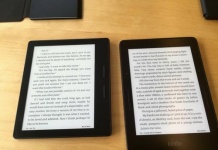 OK, gang. Parse this exchange between USA Today reporter Edward C. Baig and Amazon CEO Jeff Bezos, amid the ballyhoo for the third-generation Kindle:
OK, gang. Parse this exchange between USA Today reporter Edward C. Baig and Amazon CEO Jeff Bezos, amid the ballyhoo for the third-generation Kindle:
Q: Why doesn’t Amazon support the popular "e-pub" standard used by your competitors and many libraries?
A: We are innovating so rapidly that having our own standard allows us to incorporate new things at a very rapid rate. For example: Whispersync (which uses wireless connections to sync your place in a book across devices) and changing font sizes.
Other standards over time may incorporate some of these things. But we’re moving very quickly to improve the state of the art. It’s very helpful not to have to wait for some third-party standard to catch up.
Chris Meadows nicely shot that one down. So ePub at one point would not even allow font-size changes? Come on, Jeff. From afar I love the better traits of the new Reader and may buy one myself, and I recognize that the Amazon has its share of positives. Respect for e-book standards just isn’t one of them.
In fairness to Jeff, I’m also grouchy toward the International Digital Publishing Forum, the creator and developer of ePub. He is right about the group’s inadequacies. Two years ago and probably earlier, I myself wrote on the sync issue, suggesting that the IDPF come up with an industry standard (since we’re not talking about format matters per se, I’d have been happy simply IDPF simply recognizing others’ efforts in this area). No such luck. Whatever the reason, the IDPF has been too bleepin’ snailish in the past. I hope that changes, and in fact there are signs it might.
Regardless of Jeff’s monopolistic aspirations and the IDPF’s past slugishness, we need standards for the entire e-book industry to make e-books a truly durable medium; and rich corporations like Amazon and Adobe should be willing to help pay for the technical capabilities for the IDPF to keep up. Yes, Jeff: you should be in the IDPF, just as Google and Apple already are. You’re a freeloader if you’re not. Your dissing of Mobipocket format books—on which some hapless buyers spent hundreds and in some cases thousands of dollars for proprietary-DRMed editions they can’t enjoy on their iPads—shows how trustworthy you are on format matters. Mobipocket the company was once in the IDPF. But it isn’t now. Corporate pressure, now that Amazon owns it?
Meanwhile I’d suggest that the library world and other large buyers and potential buyers of e-books lay down the law for Jeff. “ePub when possible, or we won’t give you business. We’ll buy Kindles in small quantities or on our own to see what you’re up to. But no large institutional buys of Kindles or books in that format.” Hello, American Library Association? How much do you care about open standards? I’m going to send this post to an ALA tech expert and find out what the group is up to. Any chance ALA can come up with formal collection development guidelines that position ePub as the preferred format for books that don’t have special requirements which the standard format can’t meet? Luckily, ALA’s Office of Information and Technology Policy is an IDPF member; but that should be just the start. I want action.

































Yes, a global standard for ebooks would be a great thing, and a huge benefit to both publishers and consumers.
No, epub isn’t that standard, and never will be unless and until they define a single, fixed, DRM scheme (or the major publishers give up demanding new titles be infected with malware). I’ll take epub seriously as a “standard” the day I can buy an epub book from any vendor and read it on any epub-capable device, not before. It seems hypocritical to come down on Bezos for the “thousands of dollars for proprietary-DRMed editions they can’t enjoy on their iPads” but give Jobs a pass for the thousands of dollars people might spend on proprietary-DRMed editions that can *only* be enjoyed on an iPad.
Or for that matter, that only work on a Nook. (Yes, I’ve heard that Adobe’s supposed to update its reader system to incorporate the Nook’s DRM for other devices. I haven’t heard about devices actually getting that capability very often.)
Peter and Chris: The best DRM is none–or else social DRM, which would not create incompatibilities. Meanwhile I condemn the hypocrisy of BOTH Jobs and Bezos.
Thanks,
David
epub is no more a standard than any of the other formats out there since it leaves open the DRM specification. Adobe may adopt the B&N drm scheme, but that doesn’t mean other vendors have to implement that feature. As an open standard it is a major failure. I had high hopes for it, but they simply haven’t delivered and there doesn’t seem to be any indication it will get better.
@Peter: I agree with you that the most serious drawback of the EPUB format is its lack of a standard DRM, as stated in my article which ranks #2 in the Google’s search for “EPUB format”.
We are focusing on Web Books which use HTML5 standards and social DRM. see http://www.web-books.com/MyLibrary/WebBooks.htm.
I agree with Paul’s comment, enabling DRM made ePub a technically open but economically closed format.
I am ignorant on what’s involved in rendering of fonts and the changing of their attributes, but I did notice the Nook took an inordinately long time to respond to a request for a larger font size, needing to reformat much of the document before showing the size change, while the Kindle just instantly changes the size of the fonts on the one page you’re on so you can see the result quickly and adjust it further as needed.
I do know that reviewers have considered the Kindle display and page-changes faster than those of the others. Here’s what Amazon PR is saying in their bullet points about the faster page turns and new and improved fonts.
===
“New Proprietary Screen Technology–Faster Page Turns, New and Improved Fonts:
Kindle’s all-new, high-contrast electronic ink display is further optimized with Amazon’s proprietary waveform and font technology to make pages turn faster and fonts sharper.
Waveform is a series of electronic pulses that move black and white electronic ink particles to achieve a final gray level for an image or text.
Amazon tuned the new Kindle’s waveform and controller mechanism to make page turning 20 percent faster. In addition, this waveform tuning combined with new hand-built, custom fonts and font-hinting make words and letters more crisp, clear, and natural-looking.
Font hints are instructions, written as code, that control points on a font character’s line and improve legibility at small font sizes where few pixels are available. Hinting is a mix of aesthetic judgments and complicated technical strategies. Amazon designed its proprietary font-hinting to optimize specifically for the special characteristics of electronic ink.”
===
Now, that likely has =nothing= to do with what they’re saying about moving ahead w/o worrying about supporting ePub, which would be something else to consider while forging ahead, but maybe they just don’t want to think about that while 90% of columnists are predicting the Kindle’s imminent death (and where does that leave the other e-readers?) and while they have the competitive edge and when most of the DRM’d ePub formats (for which Adobe gets $$ for licensing) aren’t mixing well with others’ DRM’d formats.
Nevertheless, I don’t see why they can’t support just reading non-drm’d ePub directly.
Standardized, free DRM for epub is a significant issue.
I’ve read somewhere that Adobe charge something like 22 cents per book to use their DRM. That’s a significant chunk of the profit someone like Amazon makes from a book, so I don’t blame them for not using Adobe DRM.
I think it’ll take the death of DRM to lead to the end of the format wars.
Bezos’ “it’s for your own good” answer would hold more water if Amazon offered a conversion from ePub to Kindle, as it does for PDF, HTML, and MS Word. Right now Kindle owners have to use outside sources like Calibre to put DRM-free ePub books on their Kindles.
In my opinion Jeff Bezos is a liar. He can build the kindle to be able to read the epub format. It does not have to do what the kindle format does, but he can build it to read the epub format just like it reads pdf or text files. this guy is a freakin weasle and a liar who wants to enslave his customers to his format. Jeff Bezos’s real bottom line, if amazon kindle owners can’t read epub, the most popular format with ebooks, then they have to buy kindle books and will always need a kindle and hince will continue to buy kindle’s and to read all of their previously purchased ebooks even when one day the kindle supports epub as it is inevitable. I would have happily been a loyal customer to amazon, but not being able to checkout the occaisional book from my library, has made me realize that amazon is just a place that sells a bunch of crap and you can buy crap anywhere and anywhere is where i am going from now on. I just have to figure out how to switch to google ebooks and rip all the DRM out of my existing kindle titles. f$#K jeff bezos and his bald head!
David,
cookie’s note brought me back here, and I just wanted to add to your last thought that
===
“The best DRM is none–or else social DRM, which would not create incompatibilities. Meanwhile I condemn the hypocrisy of BOTH Jobs and Bezos.
===
Also B&N (Sony , though, goes the Adobe-standard ePub DRM route).
For the record, when justifiably complaining about ebooks not readable on other platforms, a reminder:
The Apple ePub DRM makes iBooks readable on only Apple devices. Period.
The Amazon DRM situation has it that one doesn’t need a Kindle to read Kindle books, and any Kindle book is readable via free Amazon apps, on a myriad of devices – PC’s, Macs, Apple’s iPad, iPod Touch, iPhone, Blueberrys, Android, webOS (when that’s ready for release), and Windows7 Phone.
It’s hilarious to see people arguing over a “standard” for text files. If you are trying to do something more complicated than HTML 1.0 can achieve, then you are trying to do too much.